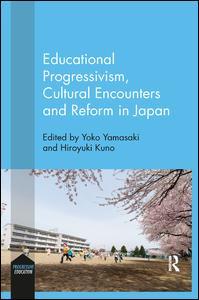Educational Progressivism, Cultural Encounters and Reform in Japan Progressive Education Series
Coordonnateurs : Yamasaki Yoko, Kuno Hiroyuki

Educational Progressivism, Cultural Encounters and Reform in Japan provides a critical analysis of educational initiatives, progressive ideas and developments in curriculum and pedagogy in Japan, from 1900 to the present day. Drawing on evidence of both cultural encounters and internal drivers for progressivism and reform, this book re-evaluates the history of Japanese education to help inform ongoing and future debates about education policy and practice worldwide.
With contributions from Japanese scholars specialising in the history and philosophy of education and curriculum studies, chapters consider key collaborative improvements to teacher education, as well as group learning, ?life education?, the creative arts and writing, and education for girls and women. The book examines Western influences, including John Dewey, Carleton Washburne and A. S. Neill, as well as Japan?s own progressive exports, such as holistic Zenjin education, Children?s Villages and Lesson Study, highlighting cultural encounters and progressive initiatives at both transnational and national levels. The chapters reflect on historical and political background, motivations, influences and the impact of Japanese progressive education. They also stimulate, through argument and critical discussion, a continuing discourse concerning principles, policy, politics and practices of education in an increasingly globalised society.
A rigorous and critical study of the history of progressive education in Japan, this book will interest an international readership of academics, researchers and postgraduate students in the fields of progressive education, comparative education, social and cultural history, history of education, Japanese studies, curriculum studies, and the history of childhood.
Introduction: Progressivism, New Education, and cultural encounters
Yoko Yamasaki
1. Origins and outline of progressive education in Japan
Yoko Yamasaki
2. Integrated Learning: Takeji Kinoshita and Nara-jo Fusho
Hiroyuki Kuno
3. Heiji Oikawa: Group-based dynamic teaching and curriculum reconstruction
Kie Fujiwara
4. Free drawingand art education: Kanae Yamamoto and Bunka Gakuin
Masayuki Haga
5. Nurturing truly free individuals through self-governing life: Motoko Hani’s Jiyu Gakuen
Naoshi Kira
6. Kuniyoshi Obara’s Zenjin education at Tamagawa Gakuen
Hiroyuki Sakuma
7. ‘Daily life writing’ in school: Creating alternative textbooks and culture
Ayako Kawaji
8. Satoru Umene: Curriculum reform and the world history of education
Akira Nakano and Yoko Yamasaki
9. Hama Omura’s Unit learning practice for Japanese classes
Kanae Nishioka
10. Kinokuni Children’s Village School: Theory and practice from Dewey to Neill and Aitkenhead
Yoko Yamasaki
11. Japanese New Education and continuing cultural encounters
Hiroyuki Kuno
Yoko Yamasaki is Professor of Education at Mukogawa Women’s University in Japan.
Hiroyuki Kuno is Associate Professor of Education at Nagoya University in Japan.
Date de parution : 09-2018
15.6x23.4 cm
Disponible chez l'éditeur (délai d'approvisionnement : 14 jours).
Prix indicatif 53,83 €
Ajouter au panierDate de parution : 06-2017
15.6x23.4 cm
Thème d’Educational Progressivism, Cultural Encounters and... :
Mots-clés :
Jiyu Gakuen; Yoko Yamasaki; Women's Higher Normal; education; Seikatsu Tsuzurikata; progressive; Tokyo Women's Higher Normal; culture; Tamagawa Gakuen; encounter; Women's Higher Normal Schools; cultural; Tokyo Higher Normal School; reform; Motoko Hani; Japan; Masataro Sawayanagi; history of education; Tokyo Woman's Christian University; comparative; Seijo Gakuen; education policy; Bunka Gakuin; education politics; Women's Middle School; learner-centred; Women's Normal School; creative; Ikiru Chikara; teacher education; Kyoto Imperial University; group learning; Higher Normal School; life education; Niels Bukh; Western education; Taisho Era; John Dewey; Tokyo Imperial University; Carleton Washburne; Fine Arts Education; A; S; Neill; Young Men; Zenjin education; Junior Secondary School; Children's villages; Red Bird; lesson study; Nara Women's University; transnational; curriculum studies; Hiroyuki Kuno; Kie Fujiwara; Masayuki Haga; Naoshi Kira; Hiroyuki Sakuma; Ayako Kawaji; Akira Nakano; Kanae Nishioka



